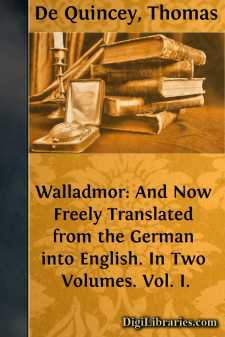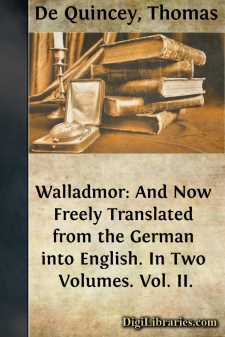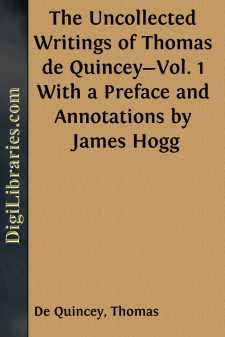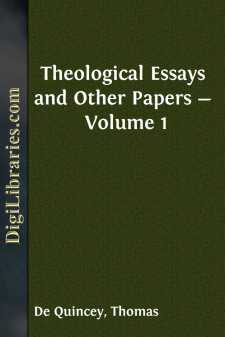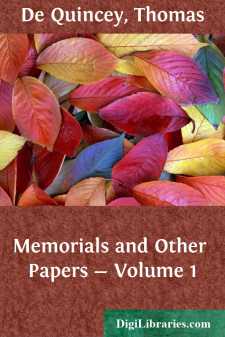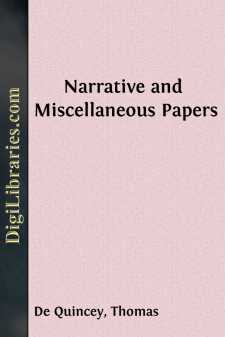Categories
- Antiques & Collectibles 13
- Architecture 36
- Art 48
- Bibles 22
- Biography & Autobiography 813
- Body, Mind & Spirit 142
- Business & Economics 28
- Children's Books 13
- Children's Fiction 10
- Computers 4
- Cooking 94
- Crafts & Hobbies 4
- Drama 346
- Education 46
- Family & Relationships 57
- Fiction 11828
- Games 19
- Gardening 17
- Health & Fitness 34
- History 1377
- House & Home 1
- Humor 147
- Juvenile Fiction 1873
- Juvenile Nonfiction 202
- Language Arts & Disciplines 88
- Law 16
- Literary Collections 686
- Literary Criticism 179
- Mathematics 13
- Medical 41
- Music 40
- Nature 179
- Non-Classifiable 1768
- Performing Arts 7
- Periodicals 1453
- Philosophy 64
- Photography 2
- Poetry 896
- Political Science 203
- Psychology 42
- Reference 154
- Religion 513
- Science 126
- Self-Help 84
- Social Science 81
- Sports & Recreation 34
- Study Aids 3
- Technology & Engineering 59
- Transportation 23
- Travel 463
- True Crime 29
Thomas De Quincey
Thomas De Quincey (1785-1859) was an English essayist best known for his autobiographical work, "Confessions of an English Opium-Eater," which explores his experiences with opium addiction and its impact on his life and work. A key figure in the Romantic movement, De Quincey's writings combine rich, lyrical prose with keen psychological insight. His contributions to literature also include critical essays and works on philosophy and political economy, influencing both his contemporaries and later writers.
Author's Books:
Sort by:
MY DEAR SIR: I am on the point of revising and considerably altering, for republication in England, an edition of such amongst my writings as it may seem proper deliberately to avow. Not that I have any intention, or consciously any reason, expressly to disown any one thing that I have ever published; but some things have sufficiently accomplished their purpose when they have met the call of that...
more...
The following novel was originally produced in the German language, as a soi disant translation from Sir Walter Scott, to meet the demands of the last Easter fair at Leipsic. In Germany, from the extreme difficulties and slowness of communication between remote parts of the country, it would be altogether impossible to effect the publication of books, upon the vast scale of the current German...
more...
Hast thou a medicine to restore my wits When I have lost them?--If not, leave to talk. Beaumont and Fletcher; Philaster. In this perplexity, whilst sitting down to clear up his thoughts and to consider of his future motions, Bertram suddenly remembered that immediately before the attack on the revenue officers, a note had been put into his hand--which he had at that time neglected to read under the...
more...
PREFACE. 'The last fruit off an old tree!' This, in the words of Walter Savage Landor, is what I have now the honour to set before the public in these hitherto 'Uncollected Writings of Thomas De Quincey.' It was my privilege to be associated intimately with the Author some thirty to forty years ago—from the beginning of 1850 until his death in 1859. Throughout the whole period...
more...
THE ENGLISH IN CHINA. This Paper, originally written for me in 1857, and published in Titan for July of that year, has not appeared in any collective edition of the author's works, British or American. It was his closing contribution to a series of three articles concerning Chinese affairs; prepared when our troubles with that Empire seemed to render war imminent. The first two were given in Titan...
more...
ON CHRISTIANITY, AS AN ORGAN OF POLITICAL MOVEMENT. [1846.] FORCES, which are illimitable in their compass of effect, are often, for the same reason, obscure and untraceable in the steps of their movement. Growth, for instance, animal or vegetable, what eye can arrest its eternal increments? The hour-hand of a watch, who can detect the separate fluxions of its advance? Judging by the past, and the...
more...
Many of the papers in my collected works were originally written under one set of disadvantages, and are now revised under another. They were written generally under great pressure as to time, in order to catch the critical periods of monthly journals; written oftentimes at a distance from the press (so as to have no opportunity for correction); and always written at a distance from libraries, so that...
more...
CHAPTER I. The winter of 1633 had set in with unusual severity throughout Suabia and Bavaria, though as yet scarcely advanced beyond the first week of November. It was, in fact, at the point when our tale commences, the eighth of that month, or, in our modern computation, the eighteenth; long after which date it had been customary of late years, under any ordinary state of the weather, to extend the...
more...
VISIT TO LAXTON. My route, after parting from Lord Westport at Birmingham, lay, as I have mentioned in the "Autobiographic Sketches," through Stamford to Laxton, the Northamptonshire seat of Lord Carbery. From Stamford, which I had reached by some intolerable old coach, such as in those days too commonly abused the patience and long-suffering of Young England, I took a post-chaise to Laxton....
more...
THE HOUSEHOLD WRECK. 'To be weak,' we need not the great archangel's voice to tell us, 'is to be miserable.' All weakness is suffering and humiliation, no matter for its mode or its subject. Beyond all other weakness, therefore, and by a sad prerogative, as more miserable than what is most miserable in all, that capital weakness of man which regards the tenure of his enjoyments...
more...



